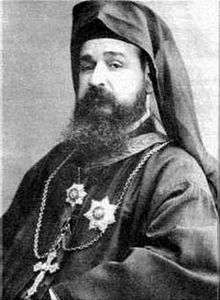Ignatius Maloyan
Ignatius Shoukrallah Maloyan (Armenian: Իգնատիոս Մալոյան, b. April 8, 1869, Mardin, Ottoman Empire – d. June 10, 1915), was the Armenian Catholic Archbishop of Mardin between 1911 and 1915.
Bl. Martyr Ignatius Maloyan, I.C.P.B. | |
|---|---|
| Archbishop of Mardin | |
 Blessed Ignatius circa 1911 | |
| Church | Armenian Catholic Church |
| Diocese | Archdiocese of Mardin |
| Appointed | October 22, 1911 |
| Term ended | June 10, 1915 |
| Orders | |
| Ordination | 6 Aug 1896 |
| Consecration | 22 Oct 1911 |
| Personal details | |
| Born | 8 April 1869 Mardin, Ottoman Empire |
| Died | 10 June 1915 (aged 46) Mardin Province, Ottoman Empire |
| Sainthood | |
| Feast day | 11 June |
| Venerated in | Armenian Catholic Church |
| Beatified | 7 October 2001 Saint Peter's Basilica, Vatican City, by Pope John Paul II |
Early life
Shoukrallah Maloyan, son of Melkon and Faridé, was born in 1869. When he was fourteen years old, his parish priest noticed in him signs of a priestly vocation, so he sent him to the convent of Bzoummar, Lebanon where the Armenian Catholic Church still has its headquarters.
After finishing his theological studies on 6 August 1896, on the feast of the Transfiguration of Jesus, he was ordained a priest in the church of Bzommar convent, became a member of the Patriarchal Order of Bzommar and adopted the religious name of Ignatius in honor of Ignatius of Antioch. During the years 1897–1910, Maloyan served as a parish priest in Alexandria and Cairo, where his good reputation became widespread.
The Armenian Catholic Patriarch, Boghos Bedros XII Sebbaghian, appointed him as his assistant in 1904. Because of a disease that hit his eyes and caused him suffocating difficulty in breathing, however, he returned to Egypt and stayed there till 1910.
The Diocese of Mardin was in a state of anarchy, so the Patriarch sent Maloyan to restore order.
On October 22, 1911, the Bishops' Synod assembled in the Vatican and consecrated Maloyan as Archbishop of Mardin. He returned to his hometown and took over his new assignment and planned on renewing the wrecked diocese, encouraging especially devotion to the Sacred Heart.
Martyrdom
In the summer of 1915, the Vali of Diyarbekir, Reşit Bey, commenced the Armenian Genocide in Mardin. Under the direction of Mardin's police chief, Mahmdouh Bey, Maloyan, along with almost all of the clergy and faithful of his Archdiocese, was force-marched into the desert. The column of deportees was escorted to a Kurdish village, Aderchek, near Cheikhan (Sheikhan), where 100 of their number were taken by Turkish troops to nearby caves and murdered.[1]
As he watched his priests and faithful massacred in front of him, Mahmdouh Bey, offered to spare Maloyan's life if he would convert to Islam. Maloyan first vowed loyalty to the Sultan in all purely civil matters, but added, "I've told you I shall live and die for the sake of my faith and religion. I take pride in the Cross of my God and Lord."[2] This enraged Mahmdouh Bey, who ordered the column to depart for a valley about four hours' distance from Diyarbekir. There, on June 10, the remaining 200 deportees were killed and Maloyan was personally executed by Mahmdouh Bey.[3] The local Kurdish population stripped the clothes from the bodies of the victims, which remained untouched for five hours until they were all collected, doused with petrol, and burned.[4]
Legacy
Maloyan was beatified in Saint Peter's Basilica by Pope John Paul II on October 7, 2001.[2]
In a sermon for the occasion, Pope John Paul said,
Archbishop Ignatius Maloyan, who died a martyr when he was 46, reminds us of every Christian's spiritual combat, whose faith is exposed to the attacks of evil. It is in the Eucharist that he drew, day by day, the force necessary to accomplish his priestly ministry with generosity and passion, dedicating himself to preaching, to a pastoral life connected with the celebration of the sacraments and to the service of the neediest. Throughout his existence, he fully lived the words of St Paul: "God has not given us a spirit of fear but a spirit of courage, of love and self control" (II Tim 1,14. 7). Before the dangers of persecution, Bl. Ignatius did not accept any compromise, declaring to those who were putting pressure on him, "It does not please God that I should deny Jesus my Saviour. To shed my blood for my faith is the strongest desire of my heart". May his example enlighten all those who today wish to be witnesses of the Gospel for the glory of God and for the salvation of their neighbour.[5]
Vatican City commemorated the centennial of Maloyan's martyrdom with a postage stamp issued on September 2, 2015.
See also
Notes
- (in French) Ternon, Yves. "Mardin dans la guerre mondiale" in Armenian Tigranakert/Diarbekir and Edessa/Urfa. Richard G. Hovannisian (ed.) UCLA Armenian History and Culture Series: Historic Armenian Cities and Provinces, 6. Costa Mesa, CA: Mazda Publishers, 2006, p. 376.
- Homily by Pope John Paul II, October 7, 2001
- Ternon. "Mardin dans la guerre mondiale," pp. 376–78.
- Ternon. "Mardin dans la guerre mondiale," p. 378.
- Beatification of Seven Servants of God, October 7, 2001
External links
| Wikimedia Commons has media related to Ignatius Maloyan. |
- "ՄԵԾ ԵՂԵՌՆԻ ՆԱՀԱՏԱԿ ԻԳՆԱՏԻՈՍ ԱՐՔ. ՄԱԼՈՅԱՆ (Archbishop Ignatius Maloyan, Martyr of the Great Calamity)." Azg. October 18, 2001.
- Saints and Blesseds of the Armenian Catholic Church
- vatican.va Entry on Blessed Ignatius Maloyan